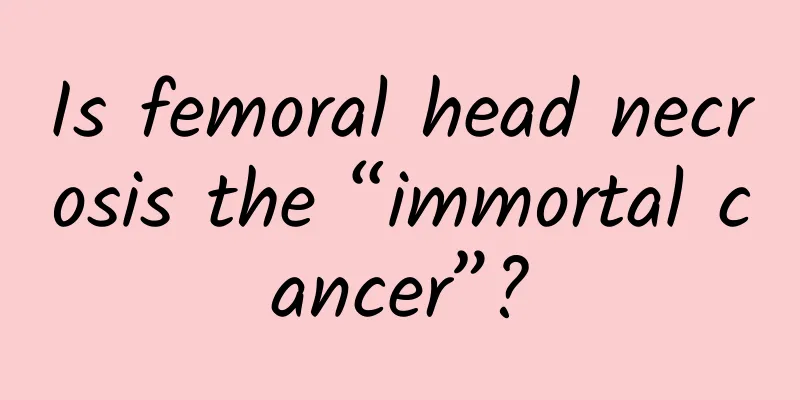Is femoral head necrosis the “immortal cancer”?

|
Author: Liu Weilu, attending physician at Nanfang Hospital, Southern Medical University Reviewer: Wang Jian, Chief Physician, Nanfang Hospital, Southern Medical University It is too exaggerated and inappropriate to describe femoral head necrosis as "immortal cancer", which will only bring a heavy psychological burden to patients. In clinical practice, we often see two types of patients: one type is anxious and even "white hair overnight" when they hear that they are diagnosed with femoral head necrosis; the other type is relieved and reborn when they hear that they are not suffering from femoral head necrosis. Why do people "change color" when talking about femoral head necrosis? Because some people believe that once femoral head necrosis occurs, it is difficult to reverse the progression of the disease by using drug treatment and other methods. Most patients will experience femoral head collapse and become disabled, thus requiring surgical treatment. Figure 1 Copyright image, no permission to reprint Nowadays, although femoral head necrosis is still incurable, most patients can work and live like normal people after proper treatment. Therefore, patients with femoral head necrosis must go to regular medical institutions for treatment, so that they can receive professional diagnosis and staging, and receive standardized treatment. They should not listen to unproven folk prescriptions or secret recipes, and should not rush to seek medical treatment. 1. What are the early “signals” of femoral head necrosis? 1. Pain: It is the most common clinical manifestation of femoral head necrosis, and it often occurs in the hip joint (crotch), thigh root (hip, groin) and buttocks. The pain of patients with early femoral head necrosis is mostly dull pain, which often occurs after activities or fatigue, and can generally be relieved by rest. However, if it is not promptly rested and treated, the pain will become more and more severe, gradually developing into persistent pain, and the range may radiate to the knee joint. Figure 2 Copyright image, no permission to reprint 2. Decreased hip joint function: As the disease progresses, the patient's hip joint becomes less and less flexible, making it difficult to bend over to tie shoelaces or cross one's legs. 3. Lameness: Femoral head necrosis causes atrophy of the muscles around the femoral head. In the late stage of femoral head necrosis, the femoral head will collapse, causing the affected limb to shorten. The patient cannot bear weight on the affected limb when walking, and limps, swaying like a duck when walking. If you find the above symptoms, you should suspect whether you have femoral head necrosis. It is recommended to go to the hospital for examination in the early stage of pain to clarify the cause of the pain. 2. Is hip pain definitely caused by femoral head necrosis? Hip pain does not necessarily mean that you have femoral head necrosis. In addition to femoral head necrosis, there are many other diseases that can cause hip pain. The following are the five most common diseases. 1. Hip muscle strain: Most patients have a history of acute trauma, and often have symptoms such as local swelling and tenderness of the hip joint, and bruising of the skin. 2. Femoral neck fracture: If it is an impacted fracture, its clinical manifestations are very hidden. The patient often does not show typical limited movement and only has slight pain in the hip, so it is easy to miss the diagnosis. 3. Hip osteoarthritis caused by hip dysplasia: Generally caused by congenital hip dysplasia, the femoral head becomes enlarged, the acetabulum becomes shallow and cannot cover the femoral head, and the femoral head is unevenly stressed, resulting in accelerated wear. With age, it develops into hip osteoarthritis, the main symptoms of which are hip pain and limited movement. Most patients are women. 4. Immune diseases involving the hip joint: Ankylosing spondylitis and rheumatoid arthritis often involve the hip joint and other parts, causing pain symptoms. 5. Lumbar disc herniation: One of the causes is irritation of the lumbar nerves. When the patient has back pain, it can also cause hip or buttock pain. In short, femoral head necrosis is only one of the causes of hip pain. What exactly causes hip pain still needs to be handed over to a professional doctor for comprehensive examination and diagnosis. |
<<: The mysterious quartet of the heart in Tetralogy of Fallot
>>: Parents must read! Uncovering the hidden "bone crisis" of children
Recommend
At what age do girls' breasts stop growing?
The development of various aspects of the human b...
What are the clinical manifestations of cervicitis?
Female friends should all know that the cervix is...
Age-related macular degeneration
As the elderly age, their collagen will gradually...
Symptoms of acclimatization: acne
Symptoms of acclimatization Acne is usually cause...
Can pickled pepper chicken feet be soaked in a stainless steel basin? What utensils are best for soaking pickled pepper chicken feet?
We all know that pickled pepper chicken feet tast...
How long should you walk every day during pregnancy?
During pregnancy, the body's resistance is re...
What is the standard weight chart for women undergoing in vitro fertilization?
In recent years, there are more and more couples ...
What color is Jin Jun Mei when soaked in water? Is the yellower the Jin Jun Mei, the better?
Jin Jun Mei has the characteristics of "clea...
Pregnant women toss and turn, the fetus will be twisted
For pregnant women, all aspects of daily life sho...
What should pregnant women wear to ward off evil spirits and protect the fetus?
For many women, accessories are an indispensable ...
Why does a woman have pain on the right side of her lower abdomen?
Due to the particularity of the structure of fema...
Don't be careless! When children say "I can't see clearly", there may be "big hidden dangers"
Children are growing up The body is constantly ch...
What should I do if a pregnant woman vomits after drinking water?
Morning sickness is a symptom that many expectant...
What is the best way to treat accessory breast?
Accessory breasts are actually a kind of malforma...
Eating leeks caused bleeding in early pregnancy
You should pay special attention to your diet in ...









